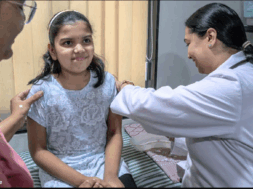
Surat’s Textile MSMEs Urged to Adopt Low-Carbon Technologies on International MSME Day
Surat: Senior government officials and experts have called for the implementation of low-carbon technologies and the availability of financing opportunities for the textile MSMEs in Surat on the occasion of International MSME Day. The workshop on ‘Energy-Efficient Technology and Finance’, organised by the Gujarat Energy Development Agency (GEDA), Gujarat Pollution Control Board (GPCB), South Gujarat Textile Processors Association (SGTPA), and WRI India, emphasized the need for sustainability in the textile sector to help India achieve its Net-Zero target by 2070.

The overall carbon dioxide emission from textile MSMEs in India stands at 2.7 billion tonnes per year, equivalent to emissions from 230 million passenger vehicles annually. However, initiatives such as the Perform, Achieve and Trade (PAT) scheme of the Bureau of Energy Efficiency, have reduced an estimated 110.66 million tonnes of carbon dioxide emissions in the textile sector.
The adverse impacts of climate change, including extreme heat and flooding, are severely affecting textile MSMEs in Surat, India’s textile hub. Many workers, part of the 80% migrant workforce, leave during the summer months to escape the excessive heat. Moreover, the over 400 textile processing MSMEs in Surat, which produce 41 million meters of cloth daily, heavily rely on fossil-fuel-dependent, energy-intensive processes.

The workshop, which brought together over 80 stakeholders, including textile MSMEs, policymakers, energy-efficient technology providers, and financing agencies, focused on new energy-efficient technologies and the financial support necessary for the sustainable transition.
Amita Pandya, senior project executive at GEDA, highlighted the agency’s efforts to support the uptake of energy-efficient technologies in industries across Gujarat. “We are in talks with financial institutions like the Small Industries Development Bank of India (SIDBI) to provide interest subsidies to textile MSMEs adopting energy-efficient technologies,” she said.
Ajit Upadhyay, an expert from the Bureau of Energy Efficiency, said, “Gujarat is the highest contributing state in woven fiber production and produces 60 to 70% of the country’s denim fabric, ranking first nationally and third globally.”

Siddheshwar Dombe, Assistant Director at the Ministry of Textiles, emphasized the significant contribution of MSMEs in Surat’s textile manufacturing sector. “The use of new technologies in textile weaving and processing reduces costs and makes MSMEs eligible for various government schemes. Skill upgradation is also beneficial for MSME owners and workers alike,” he said.
Subrata Chakrabarty, Associate Program Director, Climate at WRI India, said, “Industries and MSMEs worldwide, including in India, are at risk from the adverse impacts of climate change. Accordingly, works are going on for mainstreaming low-carbon technologies in MSMEs and facilitating their access to finance to help realize India’s climate goals and the vision of Net Zero by 2070.”
The event was a key component of the RISE (Resilient, Inclusive, and Sustainable Enterprises) Surat initiative of WRI India, supported by the Ares Charitable Foundation’s Climate Resilient Employees for a Sustainable Tomorrow (CREST) initiative. Launched on August 28, 2023, RISE Surat aims to equip at least 50 MSMEs and 500 workers in Surat’s textile sector with the tools, knowledge, and skills required for a low-carbon transition in India.














